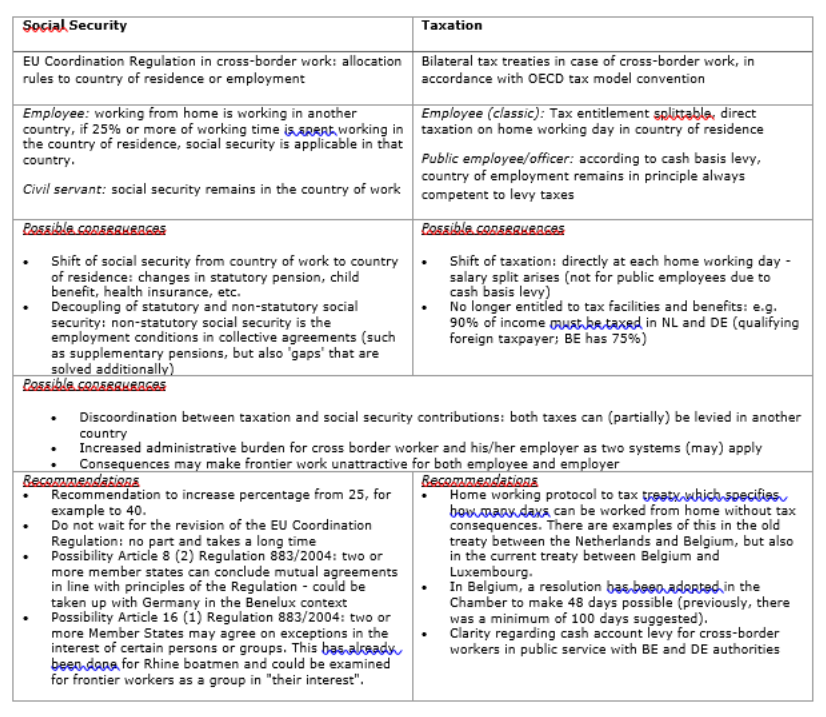Facilitating cross-border (home) working: an important precondition for the Euroregional labour market and economy
In the ITEM Cross-Border Impact Assessment 2021, the "Impact analysis into the future of working from home for cross-border workers post-COVID-19" investigated the consequences for taxation and social security of working from home by cross-border workers. Hybrid work is the future, also for the region, according to the SER advisory report 'Hybrid Work'. But working from home by cross-border workers can be complex, non-transparent and costly, both for employee and employer.
On 15 June 2022, the Next ITEM - Roundtable discussion on working from home and the problems facing cross-border workers took place. A discussion with employers, members of parliament, ministries and involved parties to exchange about the social impact and solution directions. To this end, (large) employers with cross-border workers were invited to reflect on the business and social impact. This contribution shares some of the reflections.
Working from home is here to stay
On 15 June 2022, the SER presented its advisory report 'Hybrid Work' to the Standing Parliamentary Committee on Social Affairs and Employment. The advisory report endorses the view that working from home is here to stay. Many employees indicate that they wish to continue working at home to some extent, and employers are also keen to incorporate this into their business operations. The employers present at the Next ITEM Roundtable also indicated that working from home is here to stay. The reasons for this are that employees are used to it in connection with flexibility and private work-life balance, but also from the perspective of limiting commuting (and therefore CO2 emissions) and that certain business processes are (of necessity) designed for this. Where working from home was not possible before COVID-19, it is now largely possible within the companies. In a manner of speaking, before COVID-19 for 95% it was not yet possible to work at home, after COVID-19 for 95% it is. Wherever homeworking is offered, it is eagerly used. COVID-19 has thus left permanent traces in the (new) way of working, which differ significantly from before COVID-19.
However, cross-border working from home is not yet a matter of course within the current legislative framework. After all, working from home by cross-border workers is not free of consequences under the normal regulatory framework. The ITEM Cross-Border Impact Assessment elaborates on this. The report shows that the consequences are diverse, but that in each case, the size of the effect differs and whether it is negative or positive (depending on the applicable tax and contribution rate). The table at the bottom of this contribution briefly touches on a number of points. The complete study can be found here. See also ITEM zet thuiswerkrechten grensarbeiders op de kaart and thuiswerken niet vanzelfsprekend voor grensarbeiders.
Complexity
Regardless of the advantageous or disadvantageous (net) consequences in individual cases, frontier work is becoming more complex. Employers also feel the responsibility to provide the right information, which is impossible due to the many consequences that working from home might have (which cannot be measured in net wages alone) and the required knowledge of the administrative requirements and procedures in each Member State. There is little certainty as to how home-working policies for cross-border workers should or should not be designed in order to avoid unexpected consequences (e.g. permanent establishment for the employer, loss of tax relief). An important problem is the availability of complete and clear communication about the consequences of working from home and how these can or cannot be avoided, combining the tax and social security perspectives.
Another element of complexity for multinationals is what is communicated at the level of the parent organisation regarding homeworking. If working from home is encouraged in the organisation on an international level, this creates a lack of understanding if it can lead to problems on a cross-border basis. Employees of a subsidiary company derive rights from the parent organisation's communication. Many international employees therefore do not understand why working from home would not be possible for them, if they live just across the border.
Finally, a last element of complexity concerns the duty of care of employers to take good care of the employee through additional conditions in addition to the legal provisions. The supplementary conditions laid down in a collective agreement complement the statutory package, also for matters that are important within an organisation. It is considered undesirable if frontier workers were to fall under a different legal social security system, which would lead to discrepancies. It is impossible and undesirable to subsequently impose other additional conditions on frontier workers. Employers want their employees - all of them, frontier worker or not - in one system.
Inequality & Uncertainty
Cross-border workers experience uncertainty, even while it is still temporarily without effect (after all, until July 2022, both bilateral tax agreements and unilateral exemption measures to avoid consequences due to COVID-19 as force majeure - for social security, additional exemptions apply from July 2022 to December 2022). The temporary nature of the agreements causes unease and uncertainty among cross-border workers. In a number of cases, cross-border workers specifically mention this uncertainty as a reason for terminating their employment contract. In general, relatively more terminations of employment contracts can be observed than, for example, in the previous year (in some cases 20% more resignations).
On the other hand, both cross-border workers and employers experience a sense of injustice and inequality. For example, in some organisations, cross-border workers are restricted to working from home one day a week or a maximum of 25% as soon as the temporary measures expire. This is in accordance with the hard limit in social security of 25%, see also the table below. In other organisations, no limitation or maximum limit has been set, but the limitation is effectively/indirectly felt by cross-border workers since it would lead to a change in taxation and social security. The (mutual) feeling of unequal treatment thus also follows from the current regulatory framework, an external factor beyond the employer's control.
Importance of cross-border workers in the workforce
Frontier workers make up an important part of the workforce, especially for companies located near the border. The share of cross-border commuters varied from 15% to about 40% among the participating companies. The importance of cross-border workers applies to the entire labour market region along the border. Border data of the CBS shows that in particular the COROP regions at the border have a significant share of cross-border workers. In 2019, cross-border workers accounted for at least 1% in many regions, with significant peaks in Zuid-Limburg (5.5%), Zeeuws-Vlaanderen (4.1%), Noord-Limburg (4.6%), Midden-Limburg (3.7%) and Zuidoost-Noord-Brabant (2.2%). Therefore, although cross-border employment may seem marginal on a national level, its share is significant on a meso-regional level and of very great importance on a micro-firm level.
For certain sectors, the border location has even been the argument to settle in the Dutch border region. For international companies, the international location is desirable to recruit international and/or multilingual staff. On the other hand, the border location makes it possible to recruit the expertise and skills of the workforce across the border. If working from home were no longer possible, this would make it less attractive for companies to establish themselves or remain in the (border) region.
Specifically with regard to the Dutch knowledge economy, it has been indicated that approximately 40% of the employees at Dutch universities are international, including many cross-border workers. The European Research Area (ERA) has always promoted this, whereby the Netherlands benefits greatly from incoming international talent, from just across the border or who are going to live just across the border.
Concluding: the impact
The Next ITEM Round Table on Home Working and Border Work brought together employers, stakeholders, experts, ministries and members of parliament in a closed and limited setting. The aim was to exchange insights and discuss the impact that homeworking by cross-border workers under the current regulatory framework has on the region and employers specifically. After all, as the above points show, frontier workers working from home have an important foot in the regional economy. The entire Dutch labour market is tight, with a shortage of personnel in almost all sectors. The CBS recently calculated that there are 133 vacancies for every 100 unemployed people in the Netherlands. This also applies to the labour market regions on the edge of the national borders. Cross-border workers are particularly important for these regions to retain and recruit. The cross-border labour force is also an important, if not the most important, pool of labour for many employers at the Dutch borders.
However, the uncertainty and temporary nature of the exceptions alone has caused cross-border workers to leave organisations and seek work in their own (home) country. This makes the (border) region less attractive as a location for business, which can lead to a downward spiral at the expense of the regional economy and economic activity. Working from home has therefore become an essential precondition in the new world of work. The difference with before COVID-19 is significant, both in business processes and in mentality. The unhindered facilitation of working from home by cross-border workers is therefore not only desirable for the cross-border worker himself, but also for the (knowledge) economy on and across the border as a whole.
On 14 June last, it was announced by the Dutch Minister of Social Affairs and Employment, Van Gennip, that the Member States had reached agreement on social security at the European level. In view of the tendency that several Member States indicated that it would be desirable to better facilitate working from home for cross-border workers and the observation that things would otherwise become chaotic in several Member States, an administrative agreement was made at EU level (within the Administrative Commission) for the period from July to December 2022. Frontier workers can work at home without any consequences, both existing and new frontier workers. The letter from the Minister of Social Affairs and Employment to Commissioner Schmit has helped in this matter. The wish from the Netherlands to use this extra time for a structural arrangement is welcome news. The Ministry of Finance has indicated that the temporary fiscal measures will expire in July 2022, after which the normal treaty rules will apply again. COVID-19 is not a legal basis or a farce majeure to deviate from this. This position was also communicated in a previous parliamentary letter. Talks are taking place with Germany and Belgium to introduce the desirability and possibility of a 'home working threshold' in the tax treaties, but this will take time.
Although the agreement for social security is welcome news, the expiry of the tax exemption agreements as of July entails a possible discrepancy between taxation and social security, net effects, administrative burden, complexity and loss of tax facilities.[1] Although COVID-19 is (currently) no longer a force majeure that legitimises deviation from the normal rules, critical notes can be made as to the extent to which the unprecedented labour market tightness, the socio-economic consequences for companies, cross-border workers and the border region as a whole, and especially the significance with which working and business operations have changed as a result of COVID-19, cannot in themselves be considered a force majeure. It can also be questioned whether fiscal fluctuations from exceptional rules (taxation in the country of employment on homeworking days; but optional), to normal treaty rules (taxation in the country of residence on homeworking days), and then in the future to a possible homeworking threshold (again taxation in the country of employment on homeworking days; up to a certain point) should be seen as desirable both for the cross border worker (changes in tax facilities and net income) and the employer (changes in administrative obligations and burdens).
| [1] It should be noted that civil servants or former civil servants under the Wnra (such as university staff/teachers) are subject to a different article of the tax treaty and are therefore, in principle, subject to a cash basis levy: the country of employment may levy, regardless of working from home. |

Table: point-by-point reflection ITEM Cross-Border Impact Assessment 2021 dossier 'working from home'
| More blogs on Law Blogs Maastricht |
-
Providing information for a mobile citizen – the Single Digital Gateway offers a solution?
Choosing to work or live in another country often does not happen overnight. Obtaining information beforehand is indispensable. To this end, one can rely on numerous websites that provide further insight into conceivable administrative, fiscal and social security law aspects you will be confronted...

-
Cross-border pension in the EU: the procession of Echternach
Our pensionland is in a state of flux; especially when it comes to the regulation of cross-border pensions. On 17 January, the Lower House debated the Future Pensions Act (WTP). It is surprising that in the more than 100 hours of parliamentary debates and many hundreds of pages of parliamentary...

-
Climate summit COP28 – ‘An agreement is only as good as its implementation’ Global warming and its border regions
From 30 November to 12 December 2023, the COP28 climate summit took place in Dubai. It is special because all parties agreed to phase out fossil fuel use, triple global renewable energy generation capacity by 2030 and double energy efficiency. This annual UN climate conference is the world’s largest...
